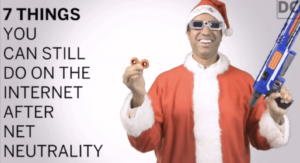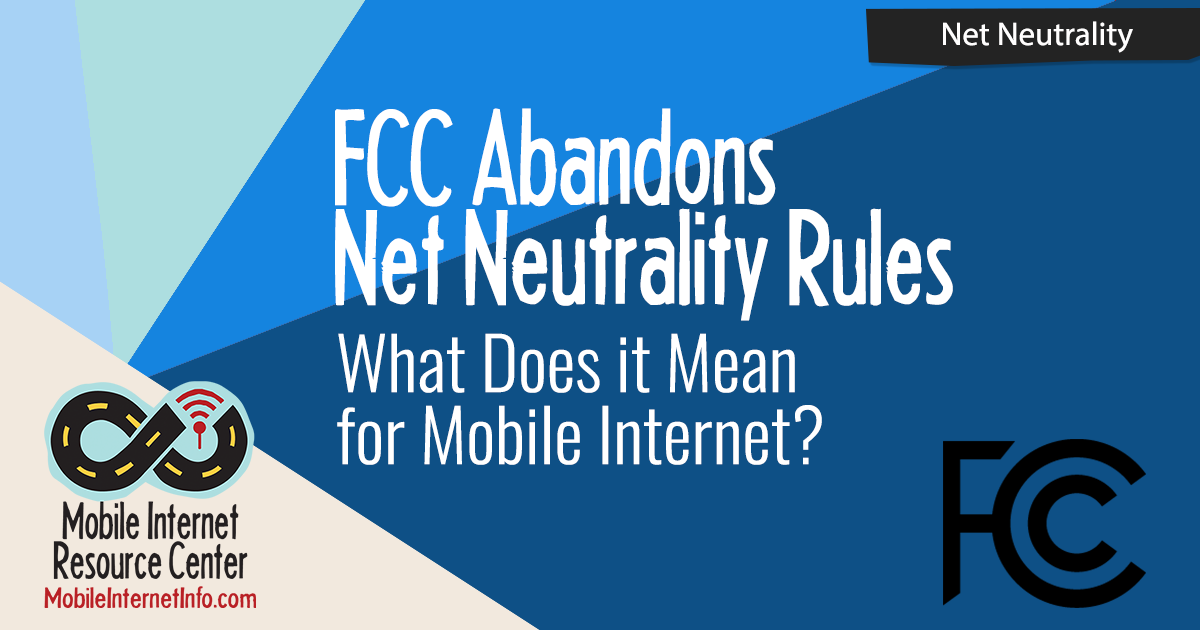UPDATE: February 22nd, 2018
The upcoming changes to the network neutrality rules were officially published in the Federal Register today, opening the door to a wave of pending lawsuits to be filed to block the changes from going into effect.
Ars Technica has two stories detailing the latest legal fights:
- We still don’t know when net neutrality rules will come off the books - The latest on the timing of the rules changes.
- Why states might win the net neutrality war against the FCC - Over half of the states are moving to enforce network neutrality at the state level, and the FCC may have surrendered its authority to stop them.
For the time being - not much has changed since our last story (below) as far as practical impacts for mobile users, but we continue to track this issue closely.
Original Story Continues Below

As expected, yesterday the FCC voted to roll back the "Network Neutrality" rules that had first gone into effect in 2015 during the Obama administration.
With the FCC majority now under the control of the new Republican Chairman (and former Verizon lawyer) Ajit Pai - this rule change was considered inevitable despite record public opposition.
Rarely have FCC rules inspired such fire and passion. But why?
Just what is at stake with changing these rules on how internet providers are regulated?
Depending on which side of this contentious issue you listen to - this rule change represents the "beginning of the end of the internet as we know it" or overdue "action to restore internet freedom" by unleashing "investment, innovation, and competition" in the internet industry.
But behind the scenes - it really comes down to control, and trust.
Who do you trust more to control and protect the open internet - mega-corporations like Comcast, Verizon, and AT&T competing with each other? Or a federal bureaucracy setting rules that all providers have to abide by equally?
There are legitimate arguments to be made on both sides.
Table of Contents
What is “Network Neutrality” All About?

Put simply - the network neutrality rules banned paid prioritization, and the blocking or throttling of any lawful content or services.
In other words - the core network needs to be neutral, and treat all traffic equally. Internet providers could not give preferential fast lanes to partners, nor punish competitors (like Netflix) by throttling speeds so that service becomes unusable.
The core "bright line" Network Neutrality rules that applied to both mobile and fixed broadband were as follows, according to the FCC:
- No Blocking: broadband providers may not block access to legal content, applications, services, or non-harmful devices.
- No Throttling: broadband providers may not impair or degrade lawful Internet traffic on the basis of content, applications, services, or non-harmful devices.
- No Paid Prioritization: broadband providers may not favor some lawful Internet traffic over other lawful traffic in exchange for consideration – in other words, no “fast lanes.” This rule also bans ISPs from prioritizing content and services of their affiliates.
These all seem like good ideas - but they do substantially limit the business models that internet providers can pursue.
Hypothetically - should a carrier be able to make 'Bing' an official search engine, and redirect all web searches to 'Bing' results? Or offer an unlimited data plan that blocks Netflix entirely, but allows HBO? Or maybe even provide free cellular service, but limit Internet access only to Facebook?
I explained the case for each side in our 2015 post when the rules were first passed:
- The Case In Favor of Neutrality: The Internet is built on openness and a long tradition of network neutrality, and services like Netflix or YouTube or even Google might never have been possible if the network providers were acting as gatekeepers. Letting internet providers block or throttle certain services in favor of ones which have paid for exclusive access to customers, or a special "fast lane", will destroy the internet as we know it, eliminating the level playing field that has made the Internet such an engine for innovation. Without the protection of network neutrality, new companies and services will never be able to reach critical mass, and only the biggest companies will be able to afford to pay for access.
- The Case Against Neutrality: The government has no business interfering with the business agreements that internet providers enter into, and doing so violates the first amendment rights of the carriers. The worries of what might happen without regulation are overblown - the FCC stepping in to enforce net neutrality is the start of a slippery slope that will lead to the government sucking all the innovation and profit out of the telecommunications industry. Investment in faster network speeds and increased coverage will dry up. And eventually... this will all just inevitably lead to more taxes, and even more regulation.
In general, most internet and tech companies (large and small) have been in favor of strong network neutrality rules, saying that they are just codifying into law long established existing practices.
And most cable TV and telecom companies have been strongly against the regulations, saying that FCC oversight is not needed. Many claim that they can be trusted to abide by the principals of network neutrality without needing regulations in place to force the issue - though interestingly, Comcast deleted the "no paid prioritization" pledge from its website the same day the new rules were announced...
And some analysts and economists have argued in favor of network neutrality ideals, but that the FCC and congress should hold off on regulations until it becomes clear that market forces will not fix potential abuse problems organically. In other words - repeal the rules and just wait and see.
The Impact of the Rule Change

One impact for mobile users of the Network Neutrality rules going into effect in 2015 was that the cellular carriers all had to back away from blanket throttling of "unlimited" data plans after they had reached a certain usage cap each month, which the FCC ruled to be unjustified and misleading.
Now all the carriers only temporarily slow down their heaviest unlimited plan users when they are on overly congested towers, because doing so is seen as "legitimate network management" and is thus allowed.
But with the rules repealed - will carriers go back to hard-throttling "unlimited" plans after a certain usage cap?
The other big fears is that carriers will go back to data pricing schemes that favor their own affiliates - like how AT&T had been on track to give its subsidiary DirecTV a huge competitive advantage, and Verizon was favoring its own Go90 video service. The FCC ruled last January that these schemes were in violation of the Network Neutrality rules, but T-Mobile's Binge-On was in the clear because T-Mobile treated all video providers equally.
Beyond just video - Verizon and AT&T both were pursuing sponsored data programs, the cellular equivalent of toll free calls, where the online services footed the bill for the data used.
Imagine - if enough customers and content providers embraced this data model, carriers would have very little incentive to ever lower the per-GB cost charged to customers for monthly data plans.
After all - the more expensive data is, the more likely customers will be compelled to seek out toll free alternatives, letting the carriers profit on both ends.
This is the sort of dark future that network neutrality rules were designed to prevent.
But...
Now that every carrier has at least partially embraced unlimited data plans, is it too late to roll back to a more limited world?
And with so much public outcry and awareness around network neutrality rules, will the internet providers dare risk the bad publicity and backlash that would result in rolling out throttling, or blocking popular sites?
For the time being - in practice, not much is likely to change at all.
So What Next?
The FCC's rule change legally goes into effect 60 days after the full text is published in the Federal Register, and that clock should start ticking soon.
One interesting twist with the FCC's new ruling is that it forbids states from enacting any Network Neutrality rules of their own, and several state Attorney Generals have announced plans to file lawsuits objecting to the rule change, and especially the block on putting state-level rules in place.
Meanwhile - there are some representatives and senators from both parties in Congress that hope to tackle the Network Neutrality issue via law rather than via FCC rule making. Democrats hope to reinstate the network neutrality rules in their entirety, and some Republicans hope to mandate weaker neutrality rules while at the same time stripping there FCC of its authority to enact any similar rules in the future.
No matter what side of the issue you are personally on, the fight over network neutrality is not over yet.
Further Reading:
This is indeed a very complicated issue. Here are a few good articles on the subject, if you'd like to know more:
- Understanding “Network Neutrality” – Implications For Mobile Internet (our 2015 featured article)
- Federal Register: Protecting and Promoting the Open Internet (the full original ruling & dissent)
- 2016 RV Mobile Internet Year in Review & Looking Forward Into 2017 (we predicted these changes last year...)
- FCC Finds Verizon and AT&T Violate Net Neutrality Rules, T-Mobile in the Clear (January 2017 ruling - the final act of the former FCC chairman)
- FCC Takes Action to Restore Internet Freedom (the 2017 reversal of the 2015 rules)
- Dissenting FCC Commissioner Statements (two of the five FCC commissioners voted against the rule rollback)
- Stratechery: PRO-NEUTRALITY, ANTI-TITLE II (a well reasoned argument in favor of the rule rollback)
- Goodbye, net neutrality—Ajit Pai’s FCC votes to allow blocking and throttling (ArsTechnica's In Depth Coverage)
- The Oatmeal Explains Net Neutrality in a Comic (biassed, but funny)
NOTE: Comments that are focused on the politics of this issue are not appropriate here, and will be deleted. We are eager to hear your thoughts on how the changes are likely to impact mobile internet users however.
Exclusive MIA Insider’s Analysis
We have included additional analysis about the implications of the network neutrality rules changing for mobile users below, including an exclusive video commentary on the issue.
Bonus Member Only Content Available!
We go extra for our premium members - who make this resource center possible (did you notice the lack of 3rd Party advertising?). We have included some additional information in this news article just for our members - analysis, guidance and/or insider tips.
If you're not yet a member, please consider joining us. Extra content like this is one of the many perks we offer - in-depth content, guidance, discounts, alerts, classroom and more.

If you are already a member, please log in above to see the special content we have prepared for you.








 Mobile Internet Resource Center (dba Two Steps Beyond LLC) is founded by Chris & Cherie of
Mobile Internet Resource Center (dba Two Steps Beyond LLC) is founded by Chris & Cherie of